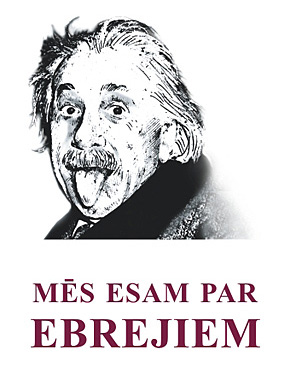Tuesday, August 29, 2006
Israeli blogger pilka writes (RUS) about a surreal experience of eating next to three clowns at a hospital in the wartime Haifa:
[...] I had breakfast with clowns today. I work at the children's department, okay? So strange, a clown on the right, a clown on the left, a vegetable salad in front of me, and next to it, a clown again. Scary. They eat in their noses and suspenders, just like that. It feels especially weird when one of them begins to complain that his wife took their little son away to Eilat, a few hours by car from here, and he hasn't seen him in two weeks already. And the other is whining that he is sick and tired of sharing a protected room with five other people, mother-in-law, father-in-law and two children. And I used to think that clowns are funny... [...]
***
LJ user auseklitis posts one of the campaign ads of the Latvian political alliance Harmony Center (Saskanas Centrs in Latvian, Tsentr Soglasiya in Russian), which can be seen in the Latvian capital, Riga:

According to auseklitis (RUS), the slogan, translated from Latvian, reads: "We are for the Jews."
[...] Of course, when you're crossing the Deglava Bridge for the first time and see the "We are for the Jews" slogan, you flinch and think that someone has decided to clearly express [his/her] position on the conflict between Israel and Hizbullah in Lebanon.
But then you notice other slogans - "We are for the Russians," "We are for the Latvians," "We are for everyone" - with pictures, and realize that this is a pre-election thing. [...]
The "Russian face" on the Harmony Center's ad is Yuri Gagarin, the first human to travel to space. LJ user chilandra, in the comment, is wondering about the choice, and auseklitis offers an explanation from the Soviet past:
Because there used to be this poem:
Good that our Gagarin
Is neither a Jew, nor a Tatar,
Neither a Tajik, nor an Uzbek,
But a Soviet person!
To which chilandra responds:
)))
Haven't heard it before.
In any case, who else but Gagarin?
[Aleksandr Pushkin] is, of course, our everything - but his national origin is unclear.
[Leo Tolstoy] is great but he looks like [Krisjanis Barons] - what if they mistake one for another.
All those Lenins, Stalins, Putins are out of question.
While Gagarin is such a positive hero. And he's wearing a space suit, which makes him recognizable.
Latvia's general election is scheduled to be held on October 7, 2006.
***
In another entry, auseklitis posts a photograph of the two-page, handwritten message left by Yevgeny Yevtushenko, a Russian poet, in the visitors' feedback book of the Museum of the Occupation of Latvia. auseklitis writes (RUS):
I have been to the Occupation Museum again. It was being shown to the great Russian poet Yevgeny Aleksandrovich Yevtushenko. And I was just humbly present there.
The poet ended up being dissatisfied with the exhibition. There was nothing there about the Congress of the People's Deputies of the USSR, in which he participated, or about [Aleksandr Yakovlev]'s commission, or about [Andrei Sakharov], or about the Russian democratic intelligentsia's support for the Latvian people's struggle for independence.
There were only bad things about the Russians.
Which is not really surprising, as the museum is run by representatives of the Latvian emigration. [It's like asking] why there's no monument to Lenin! Who gave Latvians independence in 1918. [...]
Yevtushenko, who visited the museum on July 21, 2006, spent a long time writing his impressions, according to auseklitis. Among other things, he wrote (RUS) that to ensure strong ties between Russia and Europe,
...our grandchildren should not be held responsible for the crimes and mistakes of their ancestors. This is, for example, the basis on which economic and cultural relations of the new Russian generation and the new generation of the Germans are built.
***
LJ user old_fox is marathon-blogging about the 1943 uprising in the Warsaw Ghetto. One of the entries (RUS), for example, is about underground production of explosives similar to Molotov cocktails, complete with a recipe. In the comment section, old_fox explains his reasons for this history blogging and writes about plans for the future:
In Russia, nothing normal - except for a few not bad though outdated overview works - has been translated. Moreover, they haven't been writing anything themselves. Very little documented specifics.
Of course, I am going to publish it, but in a year and a half or two. At first, everything has to be generalized and put in order. There are three parts here - information, the chronicles (I haven't started posting them yet) and portraits. Until October, the Uprising will be the main theme of this blog, in one way or another. Read it, and then, at the end of the year, I'll make additions, based on comments in this blog, too, and will decide which chapters to expand and how the book's skeleton will look.
In two years or so, it'll be time for it. The blog is a wonderful proving ground.
A reader - LJ user metaloleg - offers a suggestion:
And if the book happens, then I hope its content will be determined by the posts in this journal. More stories from the streets of the Polish capital, less general politics between London, Warsaw and Moscow - enough has been written about it.
No comments:
Post a Comment